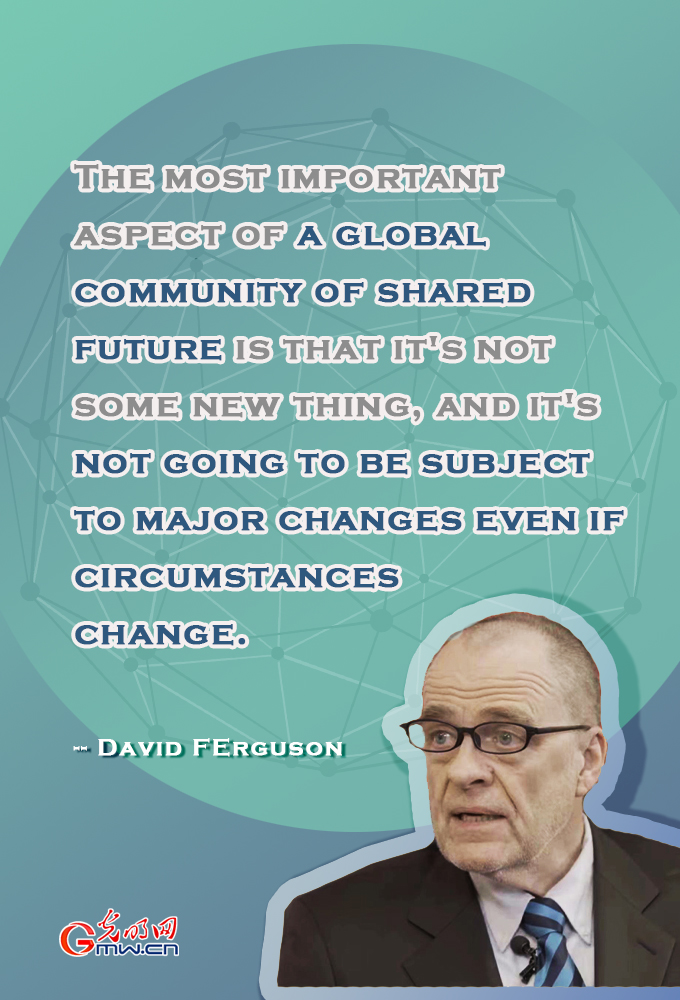One of the most interesting aspects of a global community of shared future is its continuity. The basic concept of the global community of a shared future hasn’t really changed fundamentally from the outset, said David Ferguson, English Editor of Xi Jinping: The Governance of China, during an exclusive interview with Guangming Online. The sound basis from which China sets off allows it to stay on the right path and focus on the most important and change-making part of its work. “Chinese leaders don’t have to engage in crowd-pleasing antics in order to buy votes. Instead, they can focus on the long term,” Ferguson noted. As Ferguson observed, China is able to learn from the past, and look to the future. It’s able to build long-term plans, pilot initiatives, and rule them out when they aren’t successful. And it’s able to unite and mobilize huge resources and pursue its strategic initiatives. And this is also very important in terms of a global community of shared future. In the prospect of the global community of a shared future, Ferguson pointed out that the most important aspect of it is that it’s not some new thing, and it’s not going to be some subject to major changes even if circumstances change. “Circumstances will change, but the fundamental concept doesn’t change, and I think it’s that continuity is that one of the strengths of China’s system as well as one of the reasons behind China’s success in multiple aspects, the promotion of the inclusive concept of a global community of shared future included,” said Ferguson. However, this concept is not without its challenges, and it’s not always greeted with welcoming, cooperative will. Ferguson cited an article written by a Telegraph representative headlined “China is Like a Terrorist Threat”, and, in analyzing the rhetoric of this article, Ferguson lamented how even the supposedly intelligent people in the west can easily fall victim to misconceptions about China. “These are people who are supposedly intelligent, educated people. They must have heard of the Thucydides Trap, and they must know what it is. Instead of doing everything they can to avoid the world falling into the Thucydides Trap, they seem to be doing exactly the opposite. Rushing headlong towards it, whooping, hallooing in glee. Now the point about Thucydides Trap is, it only takes one to drag us in there. It takes two working together to stay away from it,” said Ferguson. Ferguson also pointed out that to better promote the concept of a global community of shared future, China inevitably needs to counter such unfair smearing from the west and offer people in the west a faithful portrait of China’s role in today’s international community. In order to make this happen, one fundamental thing that China has to do is to engage with the mass audiences there. “They have to learn to talk to ordinary people who are being given a narrative about China, who are being taught to feel hostile to China. That way they will know the hostility that they feel is not a rational hostility. And you can only do that by engaging with people on a human level, on an emotional level,” said Ferguson. Despite all the aforementioned obstacles, when asked about his view on the prospect of a global community of shared future, Ferguson believed that this concept has already become an international consensus among people who represent the majority of the population across the world. “In developing countries, in Central Asia, in South America, in Global South, people already understand and look forward to a global community of shared future. They watch it attentively what’s happening in China. They marvel at China’s success,and they want to know what can be applied to their own situation,” Ferguson noted.
Global community of shared future is to prevail over time, challenges
Editor:谭婕倪
Source:en.gmw
Updated:2023-03-03 16:44:03
Source:en.gmw
Updated:2023-03-03 16:44:03
Special
Contact
Welcome to English Channel! Any suggestion, welcome.Tel:0731-82965627
lisl@rednet.cn
zhouqian@rednet.cn











